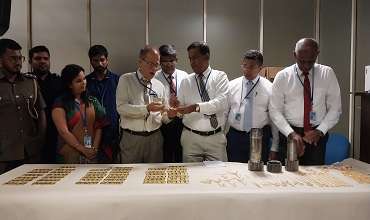Watawala Plantations PLC (WPL), is strongly pushing for change within the industry with strong efforts to promote encourage sustainable agriculture practices.
With the steep rise in pressing environmental challenges across the globe, the company has doubled down on its plan to contribute towards the best short- and long-term outcomes for Sri Lanka’s large agriculture sector and its constituents, it said in a media release.
“Watawala Plantations has always operated on the ethos that the health of our planet, people and businesses are completely intertwined. As a company that is deeply reliant on the environment, it’s up to us to push for impactful change within the industry and drive important disciplines within our operations to secure and sustain natural resources for the benefit of the many generations ahead. This also involves re-examining, reforming and realigning current agro policies with novel scientific evidence to ensure that they support a sustainable framework of action for agribusinesses across the country,” said Watawala Plantations Chief Executive Officer Binesh Pananwala.
Known for its high quality, market-leading dairy products, Watawala Dairy Ltd (WDL), produces over 750 Metric Tonnes of cattle manure – the largest quantity produced by a company in Sri Lanka -, together with over 4,000-metre cubes of cow dung slurry, comprising high nutrient levels superseding any other raw material in today’s market. This is largely credited to the addition of microbes which enhance nutrient content when the cow dung is converted to liquid fertiliser.
Further, Watawala Plantations has also commenced the production of compost. The Nakiyadeniya Oil Palm production site recently introduced the novel Watawala Sarupasa Compost, comprising various potent ingredients such as cow dung and legumes and waste slurry derived through carbides, which are compounds composed of carbon and less electronegative elements. It is a multi-purpose organic fertiliser that can be applied to a diverse variety of crops, which adds organic matter to improve the soil structure and supplies both macro and micronutrients vital to the healthy growth of plants.
The compost is enriched during the production process with two beneficial and eco-friendly plant growth-promoting Rhizosphere bacteria and two biopesticide fungi capable of controlling plant root diseases, enhancing root growth and immunity of plants, and improving beneficial biological activities of the soil food web, the release said.
This fertiliser is also unique from other market composts produced from substandard municipal waste, which contain heavy metals, hospital waste and other toxic substances.
You can share this post!
Content

A Thai woman walking topless in Arugam Bay town has been arrested by the Police.

The UK government has unveiled a package of reforms to simplify imports from developing countries which allows for more garments manufactured in Sri Lanka to enter the UK tariff-free.

Cabinet has approved the appointment of Commodore (retired) M.B.N.A. Premaratne of the Sri Lanka Navy, as the new Commissioner General of Excise.






Leave Comments